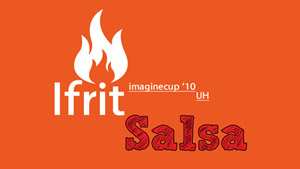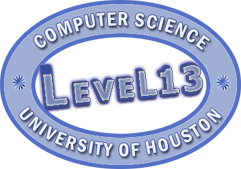Two teams from the University of Houston are among 10 finalists in a national computer game design competition sponsored by Microsoft.
The eight computer science students beat out thousands of America’s brightest young techies to reach the final round of the U.S. Imagine Cup in Washington, DC on April 23. They will vie for an $8,000 grand prize against teams from Yale University, the University of Southern California, and other schools.
UH was the only school to have two teams in the final 10. This achievement reflects the rapid progress of the university’s relatively new gaming program, said Olin Johnson, a computer science professor who is one of the instructors for UH’s game development courses.
With video game sales surpassing Hollywood box office receipts, gaming has become a multi-billion dollar industry with lucrative job opportunities. Since 2007 UH has offered computer science students courses in interactive game development and graphics.
The Imagine Cup entries started as group projects for class and in the past few months the teams have been perfecting their games. Team Ifrit Salsa, comprised of graduate student Daniel Biediger and undergraduates Alaa Gharandoq, Jesus Hernandez and Arifur Sabeth – qualified with their game “RoboRecycler.” The team’s mentor is computer science instructor Chang Yun.
Graduate student Yu-Chao Chen and undergraduates Reggie Tye, Paul Diaz and Syung Whan You, known as Team Level 13, created a game called “Antitoxin Squad.” The team’s mentor is computer science instructor Jose Baez-Franceschi.
The theme of the game design competition was to “imagine a world where technology helps solve the toughest problems” as poverty and environmental sustainability. Using the United Nations Millennium Development Goals as guidance, teams were encouraged to have fun while tackling global issues.
In Antitoxin Squad, the goal is to destroy pollution through bioremediation. Players fire cleansing plant seeds at crawling, dirty globs of pollution while dodging the toxic goo the globs are throwing their way, said Reggie Tye, a computer science junior.
At each level, the pollution globs become more powerful while the players acquire more potent weapons. The game’s seven levels reflect the planet’s seven continents and the graphics and game elements on each level reflect that particular region, Tye added.
The team behind Roborecycler wanted a game that could teach children that recycling is easy and fun. Up to four players compete to collect the most trash. Each level presents a different setting, such as a park or a beach. Players are robots armed with a claw and poker, and must pick up items, ranging from paper to plastic to glass and dump them in the right recycling bins to earn points. Not only are they competing against the clock and each other, but other obstacles - such as a pirate robot who steals your items - are also included in.
And because recyclable items differ in point value and ease of collection, gamers have to play smart to maximize their point totals.
"We wanted to convey to kids how easy recycling is and hopefully that translates into real-world behavior," said Dan Biediger, a computer science master's student and Roborecycler team member.
Game design is a particularly challenging form of software development as it requires both technical savvy and creativity, Biediger said, and the gaming courses offered at UH have help students merge those diverse skills sets.
"You know what games are fun and what ideas and elements you'd like to see in a game, and then you use your hard science side to figure out how to actually create that," Biediger said.
The Imagine Cup is an annual competition that draws thousands of the world’s brightest tech students who vie in several software categories, including game development. The very best will compete in the International Imagine Cup later this year in Poland.
In 2008 a UH team finished in the top 20 in the international round. UH students have excelled in game development since the computer science department was among the first in the nation to offer game design courses in 2007.
The gaming curriculum consists of four courses and plans are underway to offer a master’s degree in computer science with a concentration on game development in the near future. Johnson, along with assistant computer science Professor Zhigang Deng and instructors Jose Baez-Franceschi and Chang Yun teach the courses.
If you are interested in gaming coursework in Computer Science, please contact Chang Yun.

